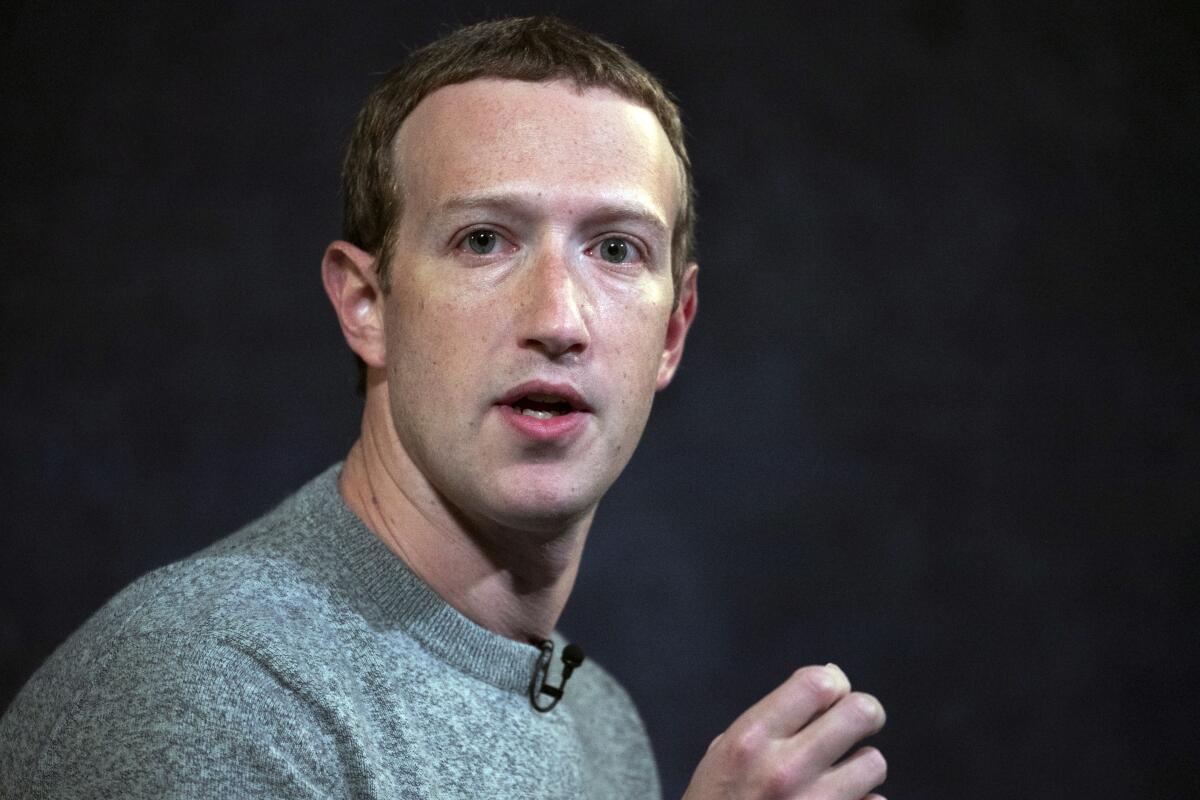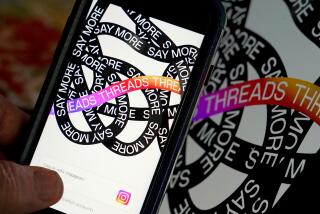Op-Ed: Mark Zuckerberg makes a ‘mwahahaha’ metaverse move

The term “metaverse” is suddenly ubiquitous, but it first appeared in 1992, in Neal Stephenson’s novel “Snow Crash.”
That engrossing novel — beloved of sci-fi fans and serious critics alike — is set mostly in a corporate-sponsored Los Angeles in the 21st century, when the city is no longer part of the U.S., the currency is in free fall (people carry quadrillion-dollar bills) and human avatars rampage through a virtual reality simulation that’s far more like an unfun game than like life as we know it. The characters, said podcast host David Barr Kirtley this month, show “no emotional vulnerability or heart-to-heart moments.” That’s the metaverse.
The philosopher Richard Rorty once wrote that Stephenson’s world represents “the end of American hopes.”
If you are rich enough in 2021 to acquire anything or any place in the galaxy, Stephenson’s desolate, hyperinflationary metaverse hardly seems to be where you’d park your zillion-dollar bills. And yet Mark Zuckerberg, the boy wonder of Facebook, no longer sees it as the stuff of fiction. He has opened his maw to consume it.
And what again is he trying to consume? Possibly everything. “Metaverse” has begun to denote the sum total of physical, augmented and virtual reality.
TV personality Jim Cramer put it non-succinctly on CNBC in July: “The metaverse is … you’re looking at basically — you can be in Oculus [using a virtual reality headset], whatever — and you say, ‘I like the way that person looks in that shirt, I want to order that shirt.’”
Good God.
On Wednesday, Zuckerberg announced that Facebook would undergo a rebrand and get a new name as early as next week. The new company will sweep up Facebook’s subsidiaries, putting the social network and data operation of Facebook under an umbrella with Instagram, WhatsApp and Oculus.
Whatever the new entity is called — and the current universe is abuzz with guesses — Zuckerberg has implied that it will exist to animate Stephenson’s grim fantasy. In the real world. Or what’s left of it.
“Our overarching goal,” Zuckerberg told employees in June, “is to help bring the metaverse to life.”
Zuckerberg is not the type to laugh like a cartoon villain — mwahahaha — but his trademark tight delivery of this “overarching goal” line is sinister enough.
Facebook seems poised to drop the pretense that its network is just an extension of ordinary fellowship, where “friends” are analogous to real-life friends and “like” is a verb, not a collectible.
The metaverse renders all that sweet, hopeful stuff as obsolete as a pandemic-era hug.
Not that the elements of the social network have been all that sweet and hopeful for a while. Facebook transmogrifies reality, turning life into zeros and ones that are under the control of a rapacious monopoly. And that’s before it expands into the metaverse.
Zuckerberg’s implied plan seems as though it could zap him into the realm of the most extreme solipsistic overlords on Earth. These are the sick billionaires who aim to colonize outer space (Jeff Bezos, Elon Musk) and live forever (Peter Thiel, Larry Page).
If Zuckerberg indeed re-creates Facebook as the metaverse, he might think he’s got the other overlords beat. After all, the metaverse, with its blockchain and illusory landscapes, doesn’t require building a spaceship that won’t blow up. And Facebook and Instagram already promise eternal life, in the form of our avatars, our avatar “friends” and our many creations in words and images that never digitally die.
How in the world could this be good? Facebook already has about 2.89 billion active monthly users who have elected to join a bank-blue matrix that gives them access to collectives, connections and opportunities and also leaves them hollowed out of their data and in the crosshairs of disinformation and agitations aimed straight for their brains.
According to the latest Facebook whistleblower, engineer Frances Haugen, the company’s methods are built to fill us with longing, contempt and bad ideas.
To do this on an even grander scale — more efficiently, more immersively — cannot end well. Even if you like the idea of buying a shirt you see in a 3D movie you think you’re part of, the full digitization of humanity means there will be much to grieve.
Still, I don’t believe the end of the world is nigh. Nor do I think we are likely to be emulsified in the metaverse, if such a thing ever materializes. (Dematerializes?) New technologies — from the steamboat to the version of the internet that Zuckerberg seems intent on making obsolete — always bring ecstatic new experiences, the need for greater literacy and soul-searching, and profound and incalculable losses. Humanity survives.
Besides, it’s highly possible that this metaverse stuff is nothing but sound and fury, especially when the only person to conjure it comprehensively is a fiction writer from 30 years ago.
Perhaps Facebook will do nothing but create a holding company with a silly new grandiose name and familiarly monopolistic aims. If so, the brave new world might be so confined to speculation, conferences and TED sermons that philosophizing about the metaverse will become the metaverse itself.
How meta.
Virginia Heffernan is the author of “Magic and Loss: The Internet as Art,” a Wired magazine columnist and host of the podcast “This Is Critical.” @page88
More to Read
A cure for the common opinion
Get thought-provoking perspectives with our weekly newsletter.
You may occasionally receive promotional content from the Los Angeles Times.










